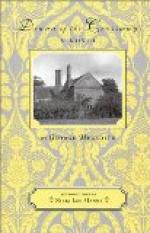The princess Egeria appeared, with the reviews at her heels, a pack of clappers, causing her to fly over editions clean as a doe the gates and hedges—to quote Mr. Sullivan Smith, who knew not a sentence of the work save what he gathered of it from Redworth, at their chance meeting on Piccadilly pavement, and then immediately he knew enough to blow his huntsman’s horn in honour of the sale. His hallali rang high. ’Here’s another Irish girl to win their laurels! ’Tis one of the blazing successes. A most enthralling work, beautifully composed. And where is she now, Mr. Redworth, since she broke away from that husband of hers, that wears the clothes of the worst tailor ever begotten by a thread on a needle, as I tell every soul of ’em in my part of the country?’
‘You have seen him?’ said Redworth.
’Why, sir, wasn’t he on show at the Court he applied to for relief and damages? as we heard when we were watching the case daily, scarce drawing our breath for fear the innocent—and one of our own blood, would be crushed. Sure, there he stood; ay, and looking the very donkey for a woman to flip off her fingers, like the dust from my great uncle’s prise of snuff! She’s a glory to the old country. And better you than another, I’d say, since it wasn’t an Irishman to have her: but what induced the dear lady to take him, is the question we ’re all of us asking! And it’s mournful to think that somehow you contrive to get the pick of us in the girls! If ever we ’re united, ’twill be by a trick of circumvention of that sort, pretty sure. There’s a turn in the market when they shut their eyes and drop to the handiest: and London’s a vortex that poor dear dull old Dublin can’t compete with. I ’ll beg you for the address of the lady her friend, Lady Dunstane.’
Mr. Sullivan Smith walked with Redworth through the park to the House of Commons, discoursing of Rails and his excellent old friend’s rise to the top rung of the ladder and Beanstalk land, so elevated that one had to look up at him with watery eyes, as if one had flung a ball at the meridian sun. Arrived at famed St. Stephen’s, he sent in his compliments to the noble patriot and accepted an invitation to dinner.
‘And mind you read the princess Egeria,’ said Redworth.
‘Again and again, my friend. The book is bought.’ Sullivan Smith slapped his breastpocket.
‘There’s a bit of Erin in it.’
‘It sprouts from Erin.’
‘Trumpet it.’
‘Loud as cavalry to the charge!’
Once with the title stamped on his memory, the zealous Irishman might be trusted to become an ambulant advertizer. Others, personal friends, adherents, courtiers of Redworth’s, were active. Lady Pennon and Henry Wilmers, in the upper circle; Whitmonby and Westlake, in the literary; spread the fever for this new book. The chief interpreter of public opinion caught the way of the wind and headed the gale.




